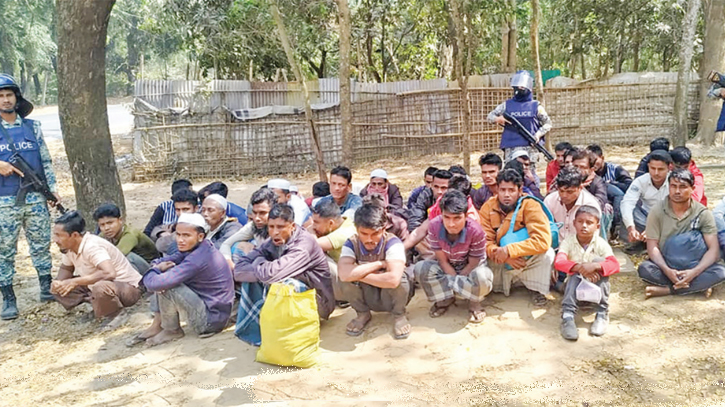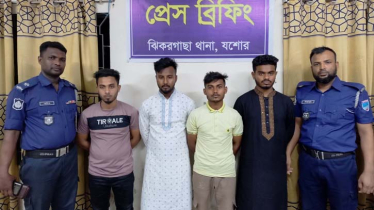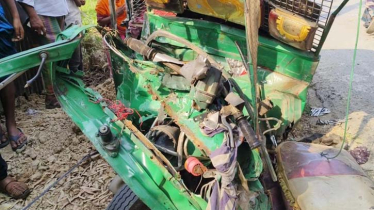
Photo : Collected
It was all quiet in eastern and northern Teknaf last Sunday.
However, early on Monday morning, several loud explosions were heard from across Rakhine State in Myanmar, shaking the region. Firing was also heard at the Palongkhali Union zero-line in Ukhiya, but no sound was heard at Ghumdhum.
As a result, several schools were shut down to keep students and residents indoors, as requested by the Border Guards Bangladesh (BGB).
The BGB has pushed back 365 Rohingyas who were crossing the Naf River from Rakhine.
Both the BGB and the Coast Guard have beefed up patrols of the Naf River, which divides Bangladesh and Myanmar. These forces have reiterated that they will fully enforce measures to prevent any illegal infiltration.
Residents of Shahporir Island said that the explosions occurred to the east of the Naf River, causing the earth to tremble. The loud noise has frightened elderly people and infants, waking them from their morning sleep.
Ayesha Akter, a resident of Teknaf, said she felt as though there was an earthquake when the earth trembled.
Local fishermen, who are familiar with the shores of Rakhine State, said the explosions were heard from across Maungdaw city in Megichongan, Kadiribeel, Nurullahpara, and Fadangcha regions.
The fishermen told the Ukhiya correspondent of The Daily Messenger that the conflict between the Arakan Army and government forces has reached its final stage.
Young people flee to villages and hills
Meanwhile, thousands of young people, mostly students, have fled to remote villages and hill forests to escape compulsory conscription. These young people do not want to fight and die for no cause. Additionally, the new generation has developed hatred against the military regime after the Nobel Peace Prize laureate Aung San Suu Kyi was ousted by the military.
Myanmar’s military dictator, General Min Aung Hlaing, enforced Myanmar’s longstanding conscription law amid heavy regime casualties and desertions in the government military forces, known as the Tatmadaw.
Initially, junta spokesman Zaw Min Tun stated that “only one person out of every 200 people” would be conscripted. However, based on that figure and the number of people eligible to serve, the actual number of recruits would be 70,000.
The activation of the People’s Military Service Law by the highly unpopular regime sparked a public outcry, as military officials announced that 14 million of the country’s young people were eligible for conscription. This amounts to 26 percent of the country’s population of 54 million, according to The Irrawaddy, a pro-democracy portal of Myanmar.
Retired soldiers have to fight
The regime has activated the Reserve Forces Law, allowing it to send veterans back to the front line. Junta leader Min Aung Hlaing explained that the decision was made because many veterans wanted to return to duty for the sake of national defence.
As of September 2021, the organisation had 91,677 members and 161,372 auxiliary members nationwide. Additionally, 308 of the 330 townships nationwide had veteran organisations, according to the veterans' website.
Suu Kyi’s house puts on sale
On the other hand, the house where Nobel laureate Suu Kyi lived under house arrest for almost 15 years has been put up for sale.
Most Myanmar people consider the house to be a symbol of the country’s democratic movement, as they recall her giving political speeches from behind its fence.
In March, the historic lakeside home and its two acres of land in the heart of Yangon will be auctioned at a starting price of more than 300 billion kyats, or about US$90 million – a figure observers say no one will pay during the current conflict.
Myanmar’s shadow National Unity Government, or NUG – former civilian leaders now in exile or hiding – has threatened to take legal action against anyone who might purchase the compound, stating that it should be protected as a place of cultural heritage.
Suu Kyi, 78, is currently in prison, having been sentenced by the junta to 33 years on 19 charges, which was later reduced to 27 years. The Peace Prize laureate was initially put in solitary confinement in Yangon’s Insein Prison, but her current location is unclear.
The lakeside home was awarded to Suu Kyi’s mother, Khin Kyi, after her father, independence activist Gen. Aung San, was assassinated in 1947.
Messenger/Fameema








